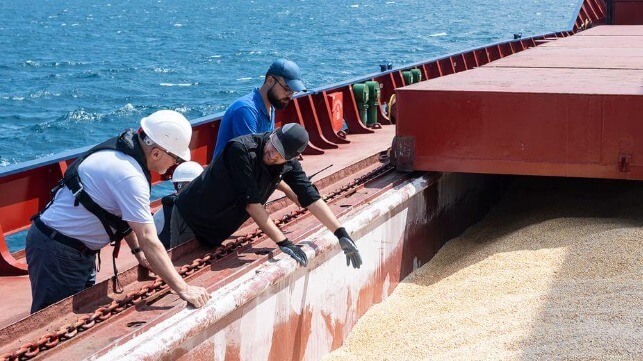Black Sea Grain Deal Renewed For Another Two Months
Russia limited its participation in this renewal round to 60 days

The Black Sea Grain Initiative has been renewed, allowing a limited amount of Ukrainian corn and wheat to flow to international markets. Though the agreement averts a suspension of the program with just hours to spare, the duration of the renewal is a matter of dispute: Ukraine claims that the deal is on for another 120 days, but Russia asserts that it only signed up for 60 days.
The UN-brokered talks succeeded in securing a renewal on Saturday, the day that the last round was due to expire. The deal ensures the continuation of one of the few successful diplomatic agreements of the war: since the signing in July 2022, some 25 million metric tons of grain and oilseed have been exported to 45 countries. According to the UN, the initiative has helped to calm global food prices, which reached extreme highs in March 2022. After the implementation of the grain initiative, prices began to fall, and within a year, they dropped by about 18 percent.
The invasion of Ukraine has had a substantial impact on global food markets. Together, Russia and Ukraine supplied about 30 percent of the world's wheat before the war, along with a major share of the world's fertilizer exports. While the program has helped to restore that flow of exports, Ukraine contends that Russia is artificially limiting the deal's potential by restricting the number of vessel inspections that it will allow each day. Russia continues to protest slow sales of its fertilizer products, which have suffered due to reputational damage and Western sanctions on Russian banking and shipping.
Given the difficulties of transacting with Russian vendors, and the prominent position of Russian exports in the crop nutrients market, global fertilizer prices have skyrocketed. Though per-ton prices have fallen somewhat in early 2023, benchmarks for phosphate and urea tripled between 2020 and 2022 - with devastating effects for small farmers in the developing world. Many have simply stopped buying fertilizer, according to the World Economic Forum, and will therefore produce substantially less food this season.

that matters most
Get the latest maritime news delivered to your inbox daily.
"It’s important this fertilizer crunch is solved," World Food Program economist Stefan Meyer told the World Economic Forum. "We have to produce enough [food] on the available land – land is limited – and fertilizer is an important component of that."
On Friday, Russian ambassador to the UN Vassily Nebenzia said that the U.S. and its allies have "two months to exempt from their sanctions the entire chain of operations which accompany the Russian agricultural sector." Nebenzia provided an extensive list of demands, including lifting sanctions on Russian shipping and access to insurance. If these demands are not met, he threatened, Russia will suspend its participation in the grain deal. If the agreement were to end, it would expose participating bulker owners to the possibility that Russia could resume attacks on merchant shipping along the Ukrainian coast.
